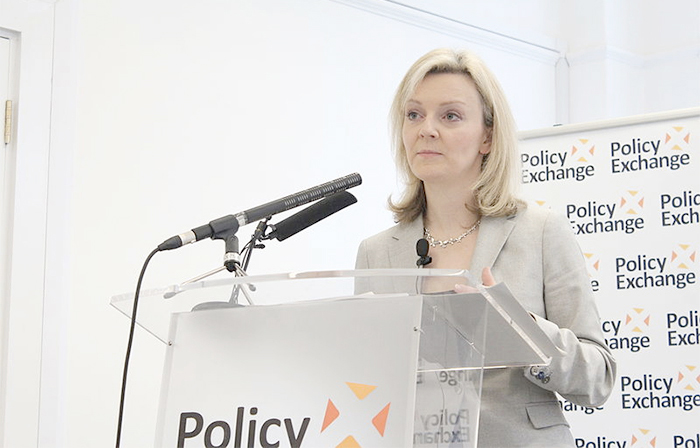
Environment Secretary Liz Truss is due to tell the Oxford Farming Conference that UK agriculture has the 'right to be both ambitious and optimistic' for the future.
Speaking at the Oxford Farming Conference, the Environment Secretary said the £100bn industry was at the core of the Government’s long-term economic plan and detailed the actions being taken to ensure a flourishing future for British food and farming.
This includes promoting British exports, cutting red tape and better protecting our country from animal and plant disease to make a real, practical difference to farmers’ working lives.
Environment Secretary Elizabeth Truss said: “Farming is a high-tech powerhouse at the heart of our long-term economic plan, vital to our country’s future security.
“We have the entrepreneurs and go-ahead farmers to ensure this, taking pride in our heritage to forge a future based on innovation, technology and the quality of our great British food.
“Over recent months we have seen fresh evidence of why we are right to be both ambitious and optimistic for the industry this year and in the future. Exports of English and Welsh wine are on course to break the £100m barrier this year. Beer exports are also breaking records, with more than a billion pints of beer sold abroad for the first time.
“No ambition is too high for British food and farming.”
But research from the Conference said British farmers were no longer competitive world leaders.
Richard Whitlock, Chairman of the 2015 Oxford Farming Conference, said: "As a whole, our farming industry is lagging behind other countries and must make bold strides to becoming more globally competitive.
"The research repeatedly highlighted that what separates the best from the rest is an individual's receptiveness to risk, their ability to save cost whilst raising output and an underlying zeal for building their businesses."
The report's author, Graham Redman from The Anderson Centre, sees underperformance being linked to direct subsidies stifling competitiveness.
He recommended to raise agricultural productivity, the decline in public research expenditure on agriculture 'needs to be halted and research investments increase.'
The conference falls at a politically charged time. In addition to the manoeuvring ahead of the General Election and following the Scottish Independence Referendum, devolution and national identity have become hotly debated topics. The line-up for the first morning is: Rt. Hon. Elizabeth Truss, Defra Secretary of State; Huw Irranca Davies MP, Shadow Minister Environment, Food and Rural Affairs; Stuart Agnew MEP UKIP's Agricultural Spokesman and Richard Lochhead, the Scottish Government's Cabinet Secretary for Rural Affairs, Food and the Environment.
"We will also hear views from three speakers with very differing agricultural viewpoints, Whitlock said.
"George Monbiot, a columnist for The Guardian and a famed critic of intensive farming, will be followed by David Caffall of the Agricultural Industries Confederation who will robustly defend best practice in commercial farming as pressure increases from single issue policy makers and campaigners, and Apollo Onyango from Kenya, a horticulturalist already adopting pest control techniques in preparation for a reduced chemical armoury."
NFU President Meurig Raymond said: “The report correctly raises concern over UK farmers’ competitiveness and rightly concludes that more investment in British agriculture by way of applied research and a greater emphasis on the sharing of knowledge within our industry is a key priority.
“We believe it is this lack of investment and applied research in British agriculture which is making it harder for farmers to do their job of producing more food for a growing population. Farmers are entrepreneurs and work hard to ensure we have enough domestic food on our plates, while protecting the environment and working to world-class welfare standards.
“During these volatile times, we face enormous challenges, most especially in providing a stable basis for investment and risk-taking. The NFU’s research with our membership also shows that burdensome regulation that penalises rather than encourages our farmers and growers to produce more food is a consistent block to meeting farmers’ productive potential. At the same time, there is a distinct lack of investment in British agricultural research to meet these challenges, whether that’s helping to remain productive during extreme weather or being encouraged to embrace new technologies.
“Farmers have worked hard to ensure that the British public are hugely supportive of the work they do in producing high quality domestic food. Our priority is to ensure we have the right tools to enable us to grow as an industry and to reverse the decline in British self-sufficiency.
“But make no mistake, our farmers and growers are up to, and capable, of the challenge.”
Opening up food and farming
Since 2010, the Government has signed deals to open 600 food markets abroad, while British food and drink exports have gone up 7% since 2010, reaching £19billion.
The Bonfield Report launched by the Prime Minister and the Environment Secretary has made it easier for public sector schools, hospitals and canteens to buy high-quality local food, helping British producers win more of a £400m market.
From April, it will be easier for shoppers to know the origin of their food, when packaged meat will have to carry a label showing the country where it was reared and slaughtered.
The Government has also maintained Britain’s world-class disease scientific capability by protecting the number of vets and expanding its investigatory capacity. This includes research to identify what genes make the best beef cattle, which is expected to contribute to £150m a year in improved farm profits.
